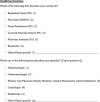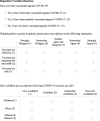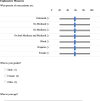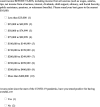Imperfect messengers? An analysis of vaccine confidence among primary care physicians
- PMID: 35315324
- PMCID: PMC8931689
- DOI: 10.1016/j.vaccine.2022.03.025
Imperfect messengers? An analysis of vaccine confidence among primary care physicians
Abstract
Background: Growing narratives emphasize using primary care physicians as leaders in efforts to promote COVID-19 vaccination among the vaccine hesitant. Critically however, little is known about vaccine confidence among primary care physicians themselves. The objective of this study was to assess both physician confidence that in general, vaccines are safe, effective, and important, as well as physician confidence in each COVID-19 vaccine in the United States.
Methods: We rely on data from a national survey of primary care physicians conducted from May 14-May 25, 2021. We assess the influence of demographic, social, and political factors on physician beliefs that in general, vaccines are safe, effective, and important, as well as physician confidence in the safety of the Moderna, Pfizer, and Johnson & Johnson COVID-19 vaccines.
Results: 10.1% of primary care physicians do not agree that, in general, vaccines are safe, 9.3% do not agree they are effective, and 8.3% do not agree they are important. While 68.7% of physicians were 'very confident' in the safety of the Moderna vaccine and 72.7% were 'very confident' in the safety of the Pfizer vaccine, only 32.1% of physicians were 'very confident' in the safety of the Johnson & Johnson COVID-19 vaccine.
Conclusion: A troubling proportion of primary care physicians lack high levels of vaccine confidence. These physicians may not be well positioned to actively promote COVID-19 vaccination even as political and media narratives push physicians to lead this effort. Interventions aimed at improving vaccine confidence among some physicians may be needed so that all physicians can fulfill needed roles as trusted vaccine communicators.
Keywords: COVID-19; Hesitancy; Physician; Vaccine confidence.
Copyright © 2022 Elsevier Ltd. All rights reserved.
Conflict of interest statement
Declaration of Competing Interest The authors declare that they have no known competing financial interests or personal relationships that could have appeared to influence the work reported in this paper.
Similar articles
-
Comparative Effectiveness of Moderna, Pfizer-BioNTech, and Janssen (Johnson & Johnson) Vaccines in Preventing COVID-19 Hospitalizations Among Adults Without Immunocompromising Conditions - United States, March-August 2021.MMWR Morb Mortal Wkly Rep. 2021 Sep 24;70(38):1337-1343. doi: 10.15585/mmwr.mm7038e1. MMWR Morb Mortal Wkly Rep. 2021. PMID: 34555004 Free PMC article.
-
The correlates and dynamics of COVID-19 vaccine-specific hesitancy.Vaccine. 2022 Mar 18;40(13):2020-2027. doi: 10.1016/j.vaccine.2022.02.033. Epub 2022 Feb 17. Vaccine. 2022. PMID: 35216840 Free PMC article.
-
Patient concerns and physician strategies for addressing COVID-19 vaccine hesitancy.Vaccine. 2024 May 22;42(14):3300-3306. doi: 10.1016/j.vaccine.2024.04.025. Epub 2024 Apr 15. Vaccine. 2024. PMID: 38627148
-
A comprehensive review of SARS-CoV-2 vaccines: Pfizer, Moderna & Johnson & Johnson.Hum Vaccin Immunother. 2022 Dec 31;18(1):2002083. doi: 10.1080/21645515.2021.2002083. Epub 2022 Feb 7. Hum Vaccin Immunother. 2022. PMID: 35130825 Free PMC article. Review.
-
COVID-19 vaccines: comparison of biological, pharmacological characteristics and adverse effects of Pfizer/BioNTech and Moderna Vaccines.Eur Rev Med Pharmacol Sci. 2021 Feb;25(3):1663-1669. doi: 10.26355/eurrev_202102_24877. Eur Rev Med Pharmacol Sci. 2021. PMID: 33629336 Review.
Cited by
-
Multilevel determinants on COVID-19 booster intention among Americans.Prev Med. 2022 Nov;164:107269. doi: 10.1016/j.ypmed.2022.107269. Epub 2022 Sep 23. Prev Med. 2022. PMID: 36162486 Free PMC article.
-
High vaccine confidence and strong approval of the mandatory immunization schedule among Bulgarian general practitioners in 2022.Hum Vaccin Immunother. 2023 Dec 15;19(3):2265640. doi: 10.1080/21645515.2023.2265640. Epub 2023 Oct 17. Hum Vaccin Immunother. 2023. PMID: 37846744 Free PMC article.
-
Strategic silences, eroded trust: The impact of divergent COVID-19 vaccine sentiments on healthcare workers' relations with peers and patients.Vaccine. 2023 Jan 23;41(4):883-891. doi: 10.1016/j.vaccine.2022.10.048. Epub 2022 Oct 27. Vaccine. 2023. PMID: 36319488 Free PMC article.
-
The role and influence of perceived experts in an anti-vaccine misinformation community.medRxiv [Preprint]. 2023 Aug 29:2023.07.12.23292568. doi: 10.1101/2023.07.12.23292568. medRxiv. 2023. Update in: PNAS Nexus. 2024 Feb 07;3(2):pgae007. doi: 10.1093/pnasnexus/pgae007. PMID: 37546922 Free PMC article. Updated. Preprint.
-
Secondary School Teachers and Outpatient Physicians: Differences in Attitudes towards Vaccination against COVID-19 in Slovakia.Vaccines (Basel). 2022 Nov 2;10(11):1858. doi: 10.3390/vaccines10111858. Vaccines (Basel). 2022. PMID: 36366366 Free PMC article.
References
-
- World Health Organization. The Impact of COVID-19 on Global Health Goals. WHO. 2021 May 20. https://www.who.int/news-room/spotlight/the-impact-of-covid-19-on-global....
-
- Blumenthal D, Fowler EJ, Abrams M, Collins SR. Covid-19—implications for the health care system. - PubMed
-
- Centers for Disease Control and Prevention. COVID Data Tracker. Atlanta, GA: US Department of Health and Human Services, CDC; 2022, March 01. https://covid.cdc.gov/covid-data-tracker.
Publication types
MeSH terms
Substances
LinkOut - more resources
Full Text Sources
Medical







